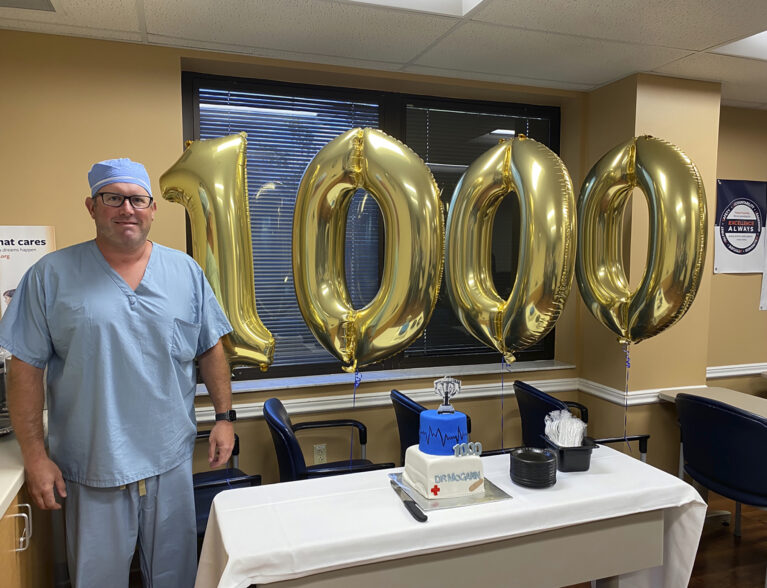
Endometrial cancer, also known as uterine cancer, is a serious threat to women’s health worldwide, with 417,000 new cases in 2020, including 61,738 cases in the United States, according to the World Cancer Research Fund. It is the sixth most common cancer in women worldwide and the 15th most common cancer overall.
Happily, it’s also one of the most curable cancers out there, according to Dr. Christopher McCann, D.O., a gynecologic oncologist affiliated with HCA Florida St. Lucie Hospital.
Hysterectomy, the surgical removal of the uterus, is the most common treatment for this cancer and with the advent of robotic surgery the procedure can be done as an outpatient, with no need for a hospital stay.
“I always tell my patients that if you are going to get cancer, endometrial cancer is a good one to get because it is very curable,” said Dr. McCann. “It’s curable because it’s generally caught early on when the post-menopausal patient presents with bleeding. Most of the time all they need is surgery, which includes a hysterectomy, removal of tubes and inspection of the lymph nodes.”
Endometrial cancer affects the lining of the uterus, called the endometrium. The uterus is a hollow, pear-shaped organ located in the pelvis where a fetus grows during pregnancy.
The cancer occurs when the cells in the endometrium grow excessively, forming a tumor.
While the exact cause is unknown, there are several factors that contribute to development of this cancer. The risk rises with age, and the disease primarily affects women in their postmenopausal years. The decline in hormone production during menopause can disrupt the delicate hormonal balance, leading to abnormal cell growth. Excess body weight and genetic predisposition also increase the risk of developing endometrial cancer.
“Ten or 20 years ago, a hysterectomy was done through larger incisions that would require admission to the hospital for a couple of days,” Dr. McCann explained. “Then we started doing it laparoscopically and those patients would stay one night in the hospital. We now treat hysterectomies with [less traumatic] robotic surgery.
“While some physicians still require patients to be hospitalized, I don’t. If the patient doesn’t have any comorbidities, I get them home the same day where they can recover more comfortably. I do same-day surgeries using the robotic platform about once a month at HCA Florida St. Lucie Hospital.”
Surprisingly, same-day hyster-ectomies were born from the era of COVID when patients didn’t want to spend time in the hospital.
“Because these were cancer patients, we were allowed to still operate while other specialties were not,” Dr. McCann said.
“One-day surgeries worked out so well that I’ve continued doing it that way in my practice.
Recovery is so much easier with the small incisions and the pain is minimal, so they might as well be comfortable in their own home.”
Robotic surgery has revolutionized the field of gynecologic oncology, offering multiple advantages over traditional open surgery and other laparoscopic techniques. The robotic surgical platform enables surgeons to perform precise and minimally invasive hysterectomies for endometrial cancer.
The patient is placed under general anesthesia and small incisions are made in the abdomen to accommodate robotic arms and instruments. The anesthesiologist, surgical assistant, nurse and scrub technician remain by the patient’s side while the surgeon sits at a console away from the patient and controls the robotic arms, manipulating instruments that are inserted through the ports. These instruments include a high-definition camera and specialized surgical tools.
The surgeon carefully removes the uterus, fallopian tubes, cervix and, if necessary, nearby lymph nodes. The robotic system provides enhanced visualization and instrument control allowing for precise dissection and removal of the cancerous tissue.
Dr. McCann said the high-definition camera provides a magnified 3D view that allows the surgeon to view the surgical site with exceptional clarity. Additionally, the robotic system offers increased dexterity and range of motion enabling surgeons to perform intricate procedures with enhanced precision.
After the surgery, the incisions are closed and the patient is sent to the recovery room, and then home with postoperative care instructions.
“Endometrial cancer has a five-year survival rate of 90 percent and nearly all patients can benefit from the use of the robotic platform,” Dr. McCann added. “The smaller incisions result in less scarring, less blood loss and faster recovery compared to open surgery. The only time we’d have to use larger incisions would be if the cancer had metastasized to other parts of the body and we had to cut the disease out.
“Robotic technology continues to advance and evolve, enabling us to perform intricate procedures with improved patient outcomes,” Dr. McCann concluded. “It’s become so common now that most residency programs only teach the robotic platform for hysterectomies.”
Dr. Christopher McCann, D.O., received his medical degree from the University of New England and completed residency training in Obstetrics and Gynecology at Saint Francis Hospital in Hartford, Conn. He completed fellowships in gynecology at Memorial Sloan-Kettering Cancer Center in New York and at Massachusetts General Hospital in Boston.
He is a full-time physician with Florida Cancer Specialists and Research Institute in Palm Beach County and is often referred to Treasure Coast patients by their local gynecologists for specialized surgeries. HCA Florida St. Lucie Hospital is located at 1800 SE Tiffany Ave, Port St. Lucie. The phone number is 772-335-4000. Florida Cancer Specialists and Research Institute is at 1309 N. Flagler Drive, West Palm Beach: 561-366-4100.



